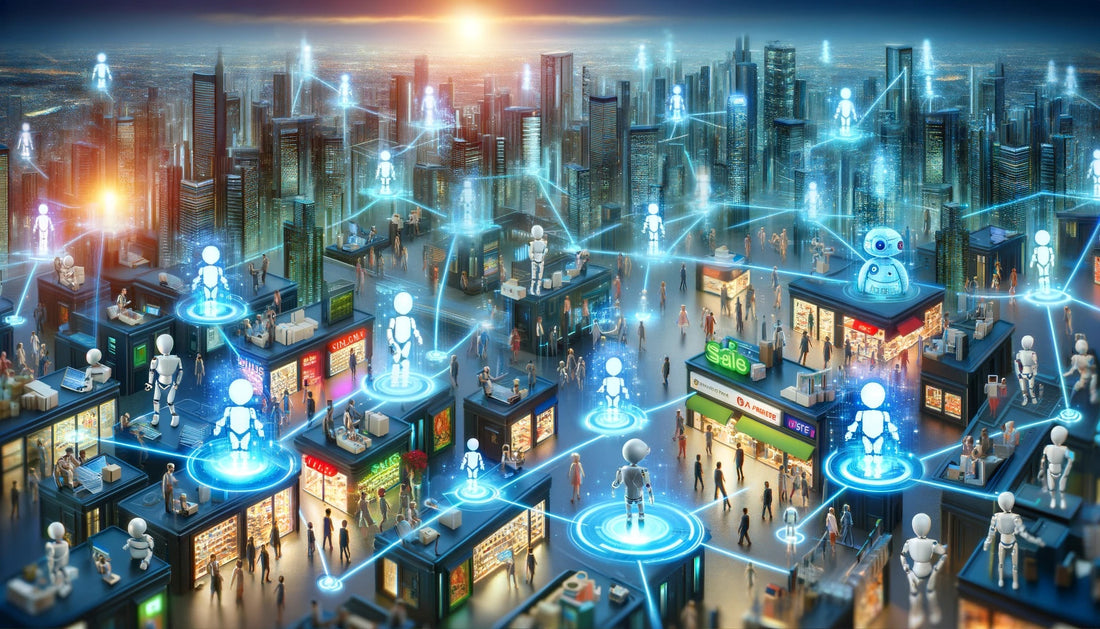As we reflect,
on the technological advancements of the past year, it's clear that 2023 was a landmark year for Large Language Models (LLMs), particularly with the widespread adoption of chatbot technologies like ChatGPT. These sophisticated AI-driven platforms have revolutionized the way we interact with digital systems, providing intuitive, conversational interfaces that have made technology more accessible and user-friendly than ever before. However, as we look to the future, it's evident that 2024 is set to be the year of a new era of AI: the year of micro bots.
Micro bots represent a significant evolution in artificial intelligence technology, marking a departure from their predecessors, which often aimed to be jack-of-all-trades, these specialized AI entities are designed with a laser focus on specific tasks. Specialized AI entities are meticulously designed with a sharp focus on specific functions, making them highly effective in particular domains such as sales, tech support, and crucially, data intelligence. A key advantage of micro bots is their capacity for rapid learning within their narrow areas of focus, allowing them to adapt swiftly to current trends and requirements. This adaptability is vital for understanding the technological shift and its widespread implications across businesses, consumers, and the broader technological ecosystem.
Sales Enhancement through Micro Bots
In the realm of sales, micro bots are poised to revolutionize the way businesses interact with potential customers. By leveraging AI's deep learning capabilities, these bots can provide personalized recommendations, anticipate customer needs, and even handle complex negotiations. This level of personalization and efficiency could significantly enhance conversion rates and customer satisfaction, offering a competitive edge that is hard to replicate with human agents alone.
Tech Support: A New Frontier
Tech support is another area where micro bots are set to make a substantial impact. With their ability to quickly parse vast databases of technical information and troubleshoot issues in real-time, these AI systems can provide instant support to users, reducing wait times and improving the overall customer experience. Furthermore, their continuous learning capabilities mean that they can adapt to new problems and solutions over time, becoming even more effective as they accumulate more data.
The Pinnacle of Data Intelligence
Perhaps the most significant contribution of micro bots, however, lies in the realm of data intelligence. In an era where data is king, the ability to efficiently collect, analyze, and interpret vast amounts of information is invaluable. Micro bots, with their specialized algorithms and deep learning capabilities, are uniquely positioned to handle these tasks with unprecedented speed and accuracy. This can empower businesses to make more informed decisions, identify trends and patterns that would be invisible to the human eye, and unlock new opportunities for innovation and growth.
The Implications for Society
The rise of micro bots in 2024 carries with it profound implications for society. On the one hand, these technologies have the potential to drive significant efficiencies, reduce costs, and enhance the quality of services across a range of industries. On the other hand, their adoption will also raise important questions about the role of human workers in an increasingly automated world, the ethical considerations of AI decision-making, and the need for robust regulatory frameworks to govern the use of such technologies.
Enviromental Impact
Micro bots not only signify a leap forward in AI's functional specialization but also offer a sustainable approach that contrasts with the resource-intensive nature of their larger conversational counterparts. Running comprehensive conversational AI systems typically demands substantial computing resources due to their complexity. However, by leveraging the indexing capabilities of LLMs to streamline data processing, micro bots significantly reduce the need for such extensive computational power. This efficiency makes it feasible to operate these AI entities on devices with far less processing capacity transforming them into another everyday app.
In 2023, significant attention was drawn to the energy consumption required to train and run large language models like GPT and Google's DeepMind. However, the shift towards micro bots offers a more sustainable approach. By leveraging a few large models, such as OpenAi's GPT and Meta's (almost open-source) LLaMA2 and the highly anticipated LLaMA3, along with open-source options provided through Hugging Face, we can reduce the need for countless energy-intensive AI systems. Micro bots utilize these powerful LLMs through indexing capabilities, drastically cutting down the computational power required. This approach not only lowers energy consumption but also aligns AI technology with environmental sustainability goals.
The environmental impact of this shift cannot be overstated. This drastic reduction in computational demands translates to lower energy consumption, making micro bots not only a cost-effective solution but also a greener choice.
Conclusion
The advent of micro bots in 2024 marks a significant milestone in the evolution of artificial intelligence, heralding a transformative era in sectors like sales, tech support, and data intelligence. As we embrace this new wave of AI, it's crucial to consider both the vast potential and the ethical implications it brings. The integration of micro bots into our daily lives and industries promises to streamline operations and redefine human-machine interactions. At WhisperAiML, we are committed to leading the way in this pioneering journey. We pledge to navigate the complexities and opportunities presented by micro bots with a focus on innovation, ethical standards, and the betterment of society. Engaging with these technologies thoughtfully and critically will be key to harnessing their benefits while navigating the challenges they present, a mission WhisperAiML is dedicated to advancing.
